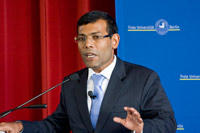“This is not a game. Climate change is real.”
Mohamed Nasheed, President of the Maldives, during a Visit at Freie Universität Made an Urgent Appeal to Fight Climate Change
№ 56/2010 from Mar 12, 2010
“We do not have the luxury of time. Our existence is threatened,” said the ruler of the lowest lying country in the world. Hundreds of thousands of Maldivians would need a new home, if the rising sea level makes the islands of the archipelago in the Indian Ocean uninhabitable. But of course nobody wants to leave their homeland.
Mohamed Nasheed regretted the apparent lack of interest, inertia, and sheer skepticism on the part of politicians and the general public toward the threat of climate change. He invited those present to go and take a look for themselves at the dramatic situation in what up to now has been a tourist paradise: “Come and see what it is like to live a few feet above the sea. Come and observe the coastal erosion. Come and witness the bleached coral reefs. And when you have seen all this, then try to look us in the eye and tell us climate change isn’t happening.”
In his lecture, Nasheed expressed disappointment with the outcome of the United Nations climate summit last December in Copenhagen. He stressed the urgent need for concrete actions rather than long, ineffective discussions. It is absurd to be more concerned with the negotiation process than with concrete measures to combat climate change. Nasheed directed his appeal to the citizens and policy makers of the Federal Republic of Germany. Up to now the discussions on climate change have been largely guided by political and economic interests. Science and research play a particularly important role. Dr. Kirsten Jörgensen from the Environmental Policy Research at Freie Universität drew attention to current projects in which researchers from Freie Universität deal with climate change.
Mohamed Nasheed is the first democratically elected president of the Maldives. In October 2009 he drew attention to the situation of his island nation by holding an underwater cabinet meeting that issued a declaration calling for concerted global action to reduce environmentally harmful carbon dioxide emissions. As an opposition activist, he led a nonviolent fight against the authoritarian regime of Maumoon Abdul Gayoom, who governed the country for 30 years. Nasheed was prosecuted for his political activism and imprisoned several times. In 1991 in recognition of his nonviolent activism, the human rights organization Amnesty International declared Nasheed a “prisoner of conscience.” After successfully founding the Maldivian Democratic Party in 2005, Nasheed was elected President of the Maldives in 2008. He has been honored with numerous awards for his political activism and his battle against climate change. In 2009 he was awarded the Anna Lindh Prize in recognition of his outstanding commitment to human rights, democracy, and environmental protection, and last September he was named “Hero of the Environment” by Time magazine. Nasheed has placed himself at the forefront of climate activists among the so-called developing and emerging economies.
Further Information:
- Office of News and Public Affairs, Freie Universität Berlin, Tel.: +49 (0)30 / 838-73191
Email: kommunikationsstelle@fu-berlin.de - Dr. Kirsten Jörgensen, Environmental Policy Research Centre, Freie Universität Berlin
Tel.: +49 (0)30 / 838-55097, Email: kirstenj@zedat.fu-berlin.de
The entire lecture is available as a video in Freie Universität’s online magazine campus.leben.

